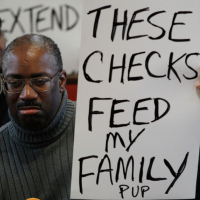North Carolina becomes First State to Reject Federal Aid for Long-Term Unemployed
 (photo: Matt Rourke, AP)
(photo: Matt Rourke, AP)
In a fit of austerity, the state legislature of North Carolina has decided to turn down free federal money and end unemployment benefits for 70,000 people this Monday—just to save businesses some money and make extra payments on a “debt” that is not due until 2018. Although Democrats fought the measure, the Republican majority forced it through, prompting Senate Minority Leader Martin Nesbitt (D-Asheville) to complain that “this is getting to be a mean, mean place for people at the bottom and working families in this state.”
The new law cuts the maximum unemployment benefit by about one-third, from $535 a week to $350, and slashes the maximum weeks of benefits from 26 to a sliding scale between 12 and 20 weeks. Because the new law violates a federal requirement that states maintain current benefit amounts in order to qualify for extended federal benefits, the new law will stop benefits for about 70,000 workers who have exhausted their state benefits but cannot find a job.
Although Democrats tried to amend the bill to preserve the extended federal benefits, House Republicans rejected that idea. Democrats criticized Republicans for heartlessly “punishing” the unemployed at a time when the state’s unemployment rate of 8.8% is the fifth highest in the nation. Rep. Paul Luebke (D-Durham) noted that to the unemployed, “this is critical income…that in some instances is the difference between losing a house, foreclosure, losing a car, repossession, or getting along a little bit.”
“Why is that necessary when this benefit is 100% federally paid?” asked House Minority Leader Larry Hall (D-Durham).
Although the state estimates that the benefits have been injecting about $20 million a week into the local economy, and projects a loss of at least $475 million, Republican legislators are unrepentant. They say the plan is necessary because the state—like 20 others—owes about $2.1 billion to the federal government, from which it borrowed funds to pay state-funded jobless benefits when unemployment soared in 2008.
The borrowing triggered higher federal unemployment taxes for businesses, and it was the North Carolina Chamber of Commerce that wrote the legislation. Perhaps not surprisingly, they wrote the law to serve business, as benefit cuts on the jobless make up 74% of the savings, with higher business taxes covering only 26%.
Not paying the debt early would hurt businesses and possibly increase the debt, claimed Rep. Julia Howard (R-Davie), who also said the cuts will push people to find work faster: “It may not be the job that you want or your career for the rest of your life. But to take a job, get back into the job market,” asserted Howard, apparently under the impression that long-term unemployment is voluntary.
Forty-five year-old North Carolinian Lee Creighton, who has a Ph.D. and whose most recent job was managing statisticians and writers, has been unemployed since October 2012 and might beg to differ. Unable to find long-term employment, Creighton has depended on the extended benefits and the help of his parents, and asked the question currently on the minds of thousands of North Carolinians. “I’m just not sure what I'm going to do,” he told the Associated Press. “What are we to do? Is the state prepared to have this many people with no source of income?”
-Matt Bewig
To Learn More:
Democrats Rail against Law Ending Extended Unemployment Benefits (by David Ranii, Raleigh News & Observer)
NC Poised to become 1st State to Drop Federal Jobless Funds (by Emery P. Dalesio, Associated Press)
- Top Stories
- Unusual News
- Where is the Money Going?
- Controversies
- U.S. and the World
- Appointments and Resignations
- Latest News
- Trump to Stop Deportations If…
- Trump Denounces World Series
- What If China Invaded the United States?
- Donald Trump Has a Mental Health Problem and It Has a Name
- Trump Goes on Renaming Frenzy






Comments